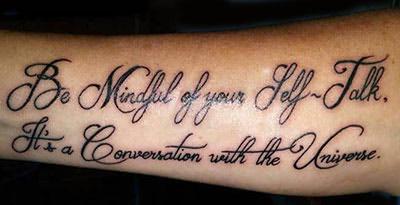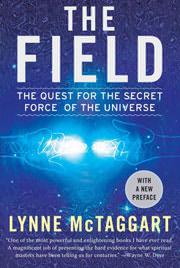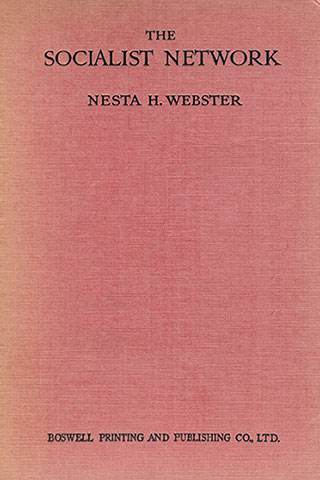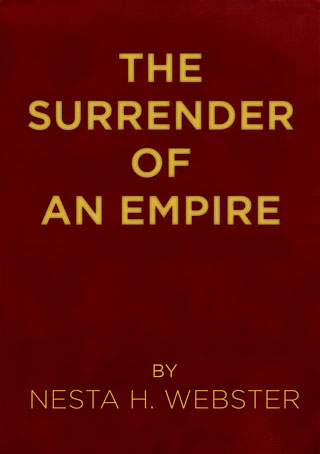Be Mindful of Your Self-Talk, It’s a Conversation with the Universe
 A lady from Montreal recently contacted us on Facebook and sent us a picture of her tattoo of one of our Wu Wei Wisdom quotes: Be mindful of your self-talk it’s a conversation with the Universe. She wrote: ‘Needless to say that your words really resonated with me…enough to put them under my skin forever. (freshly done) Thank you.’
A lady from Montreal recently contacted us on Facebook and sent us a picture of her tattoo of one of our Wu Wei Wisdom quotes: Be mindful of your self-talk it’s a conversation with the Universe. She wrote: ‘Needless to say that your words really resonated with me…enough to put them under my skin forever. (freshly done) Thank you.’
Well, needless to say we were very moved by this. This little saying has has attracted a lot of attention and many questions from followers and so we thought we’d spend some time explaining the meaning behind these words.
This post and audio teaching is the first of two parts.
You can listen to our full teaching here:
You can read the full transcript of this teaching below:
“Be mindful of your self-talk it’s a conversation with the Universe.”
Alex: This little quote has been very popular and we receive lots of questions about it, so I thought I’d grab David to see he could explain the teaching in more detail. In a nutshell David, what’s the core message behind this teaching?
David: Well, I think everyone has an inner-dialogue with themselves throughout the day, but have you ever considered who is doing the talking and who is listening … or the deeper effect this self-talk has on you?
Your internal chatter and the way you talk to yourself is a form of energetic communication or vibration that extends beyond the moment that the dialogue happens as well as the confines of your private internal world. So, although your self-talk may be internalised, private, low-level chatter or background noise for much of the time, your self-talk will ultimately have a profound impact on you.
Alex: Can this effect be both negative and positive, depending on what I say to myself?
David: Yes, and what I’m saying here is that you should be more aware, mindful or careful of the words you use when you talk to yourself.
The Taoists teach that: ‘Words are the bricks that build the house you live in’.
I want to inspire you to understand the power of your self-talk so that you can use it wisely and as a force for good in your life.
Alex: David, many people are unsure about the origin and nature of their self-talk … and I must admit I’M a little confused about this too. There seems to be several different schools of thought on where this inner-dialogue comes from — so I’d love to know your view on this?
David: Your internal self-talk is something that happens often without being fully aware of it. It’s your human mind and Ego creating the illusion that it is separate and the controller of you, and therefore somehow able to pass judgment. But how could this be possible because you are whole (I’ll explain more about this ‘wholeness’ in a moment).
Now, your self-talk isn’t always a bad thing, if it comes from a place of love and wholeness rather than separation or hierarchy. It can be used in a very conscious and positively motivating way. Think about athletes psyching themselves up as they prepare for the beginning of a race.
Alex: OK, this makes sense. I guess it’s also like when a tennis or golf player keeps a ‘winning mind-set’ and a positive inner-dialogue going, even when they may be lagging behind their opponent. Is this right?
David: Yes, and affirmations can also be used in the same way and can be very effective — if you fully believe what you are affirming and they are truthful.
The problem is that much of our inner-dialogue does not happen so consciously or in such a mindful or self-regulated way. More often than not the inner-voice of your human Ego mind can be very judgmental, critical and negative because it comes from a place of doubt about the unknown and its desire to keep you safe and protected.
Alex: I can definitely relate to this! I guess it’s our self-talk that will be saying things like: ‘you’re not good enough’, ‘your unlovable’, ‘you’re too fat’, ‘you made a mess of that’, ‘you’ll never do this’, ‘you’ll never make it’, ‘you can’t cope’…. Is this right?
David: Yes, this dialogue often goes on without you even being aware of it. Over time, this becomes a pattern of repeated thoughts and self-talk that becomes like a ‘carousel’ — it just goes round in circles endlessly like background music.
The best time to observe your self-talk in full flow is if you wake up in the early hours of the morning — this is what I call the ‘3am mind’. When you’re awake in middle of the night like this have you ever found yourself thinking things like: ‘oh didn’t I do well yesterday’, ‘aren’t I great’, ‘tomorrow I’m going to have a fantastic day’?!…
Alex: No! The chatter in the middle of the night is normally really negative stuff! But then in the morning often everything can seem a lot better — so what’s the problem here?
David: Over time, and if not questioned and corrected this inner-conversation will cement any doubts about yourself: doubt your abilities and your many beautiful qualities… and doubt the essence, inner-truth and the divine spirit and power of you. When this happens you’ve fallen for the illusion of the human Ego mind — you’re under its spell!
So, you can see how this seemingly insignificant, private, internal conversation can have a profound effect on your health, wellbeing, emotional balance and also your life satisfaction and potential.
Alex: OK, I think I and many other people will be able to recognise the sort of self-talk they have with themselves and that it’s not always very encouraging or helpful.
Many people still believe that their internal dialogue remains purely ‘internal’ though…. but if my self-talk is me just talking to me, how can it also be a conversation with the Universe?
David: Well, you have to understand that you are more than your human body and mind, and you are certainly greater than the narrowly defined artificial limitations that your human mind and Ego tries to label, control and restrict you with through your self-talk.
The Taoists teach that you are made up of: body, mind and emotions (what the Taoists call ‘Xin’, or heart-mind). These are your human centred or Yang qualities. But you also have a deeper essence, spirit, soul or higher-self — this is the Yin part of you and what the Taoists call ‘Shen’.
It is your Shen that remains your connection to your spiritual and energetic Source even when you are in human form. Remember: you came from Source, you will return to Source (whatever you believe that to be), therefore the essence of you is Source.
Alex: I love this concept of Shen David — tell me more!
David: Imagine your Shen as if it were a beautiful golden light of pure energy that resides within you and is a reflection of the Cosmos. All the energy, love, abundance of the Comsos can be maintained through this connection IF you allow it. This energetic relationship with the Cosmos is your birthright, it doesn’t have to be earned and it can never be lost, but you do have free will and you can choose to ignore or devalue it.
And this is where your self-talk is vital: the inner-dialogue you have with yourself is also the means of communicating and harmoising with the Universe. It can either strengthen or pull you away from this natural partnership and energetic relationship.
Alex: Wow, that’s a profound teaching! Let me see if I’ve understood this right: so when my human mind criticises me it’s actually criticising the very essence of me…and if I choose to listen to the negative self-talk or the lies of your Ego without question, this is when I begin to doubt my divine nature, my potential and also reject my relationship to what you call ‘Source’. Is this right?
David: Yes, and once this happens the natural positive flow of energy between you and the Cosmos that I have spoken about can become blocked and stifled.
Alex: So how does this work?
David: Well, if you accept the principle that everything in the Universe is made up of energy, you will also understand that every thought you have, every word you speak, and every action you take, also has a unique energy and a vibration. This vibration has a life, resonance and power that extends outwards beyond the moment. .
These energetic vibrations are the language and currency of the Cosmos, and your self-talk has an energy, positive or negative, that is received by the Cosmos.
Alex: This teaching on energy definitely ties in with modern scientific thinking and quantum physics David. I guess the big unknown remains for me is: what happens once the energy of my self-talk is out there on the Cosmos vibrating away!?
David: The Cosmos does not have an intelligence and so it cannot interpret, second-guess or pass judgment as to whether the energy and vibration of your self-talk is truthful, authentic or even healthy for you. It simply harmonises and matches with the vibration you send it and then reflects this energy back to you.
The Taoists teach that this is the way of everything in nature and the Universe.
Alex: OK, so what you’re saying David is: you get back what you give out!… Is it really that simple?
David: Yes, and as my grandmother used to say ‘be careful what you wish for….’!
If you say to yourself ‘I’m useless’, I’m a failure’, ‘I’ll never achieve this’ etc. — guess what you’ll get back?!
Alex: David what you’re talking about here sounds a lot like the ‘Law of Attraction’ by another name! Is this right?
David: Yes, this is something that the Taoists understood and taught many thousands of years ago. They referred to this principle as ‘Yi Tao Qi Tao’, which can be interpreted as: where your intention flows, so the energy or love follows.
One comment
Digital discoveries
- Migliori Casino Online
- Casino Non AAMS
- Siti Casino
- Sites De Paris Sportifs Belgique
- Tous Les Sites De Paris Sportifs Belgique
- Meilleur Casino En Ligne Belgique
- Casino En Ligne Belgique Bonus
- I Migliori Casino Online
- Non Aams Casino
- Scommesse Italia App
- Migliori Casino Online Esteri
- Paris Sportif Crypto Sans Kyc
- Site De Paris Sportif
- Sweet Bonanza Avis
- Paris Sportif Ufc
- オンラインカジノ 出金早い
- Casino Live En Ligne Français
- Site De Paris Sportifs
- Meilleurs Nouveaux Casinos En Ligne
- Casino En Ligne Français
- Casino En Ligne
- Casino Retrait Instantané
- Casino En Ligne Fiable
- Meilleur Casino En Ligne 2026
- Casino En Ligne Retrait Immédiat
- Casino Français En Ligne
- Casino Italia Non Aams
- Casino Con Free Spin Senza Deposito
- Siti Di Scommesse Non Aams
- Migliore Casino Non Aams
- Casino Online Non Aams 2026
- 토토사이트 모음
- Top 10 Trang Cá độ Bóng đá
- Casino En Ligne
- Casino En Ligne France
- Casino En Ligne Argent Réel
- Casino En Ligne Retrait Immédiat 2026
- Nouveau Casino En Ligne 2026









lust what I needed I do belive in the concept of self talk I am on a road to self discovery about who I am and who I want to be after many false paths at 84 I see achance to understand something about my perpose in life thankyou for your insite love for all leo